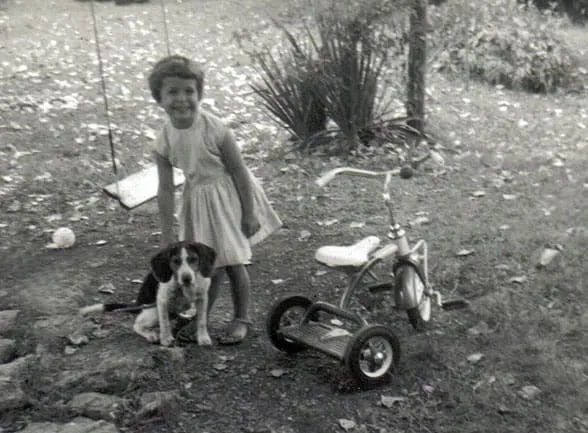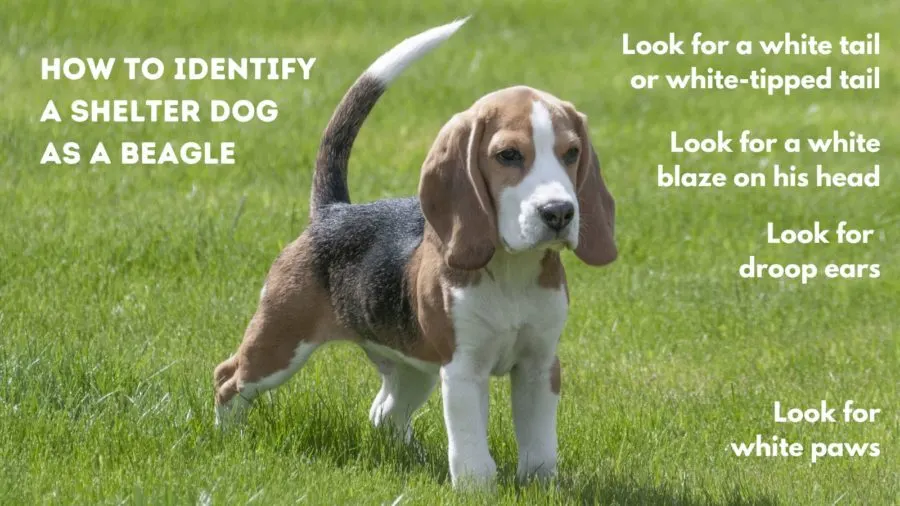Beagles–whether those standing 13 inches or shorter or those in the 13-15-inch category–are universally recognized for their cheerful demeanor. If you are considering adding a Beagle to your family, you’ll find them at breeders, breed rescues and shelters in your area. Let’s take a look at the Beagle price at each of these options–and the pros and cons of each choice.

Beagle Price at a Breeder
There is no set price for a Beagle puppy; costs vary greatly depending on numerous factors. Generally speaking, though, you can expect to pay between $800 and $1,200 for Beagle puppies from reputable breeders. Expect to pay much more if you are looking for show-quality puppies.
The price will depend on several factors:
The color of the Beagle. AKC recognizes many Standard Beagle colors–but lists numerous non-standard colors as well. Puppies with more common colors–such as the most common Black, White and Tan or Brown, White and Tan–will be priced lower. Non-standard colors and color combinations–such as Lemon, Lemon and White, Red, Tan, Blue, Brown or Black are priced higher at some breeders just because they are more unusual.
The genetic testing that has been done on the Beagle puppy’s parents. The best Beagle breeders will have dogs that have passed health screenings and have Canine Health Information Center (CHIC) numbers. Dogs can only be granted a CHIC number by taking mandatory health screenings. (You’ll find a list of the mandatory health screenings–and the optional screenings–in the health section below.)
The location of the breeder. Breeders in large cities often charge more for their puppies due to increased demand.
The pedigree of the parents. Show Beagles that have participated in sanctioned competitions have more expensive litters than Beagles without titles.
The age of the dog. Beagle puppies, like all other breeds, are definitely more expensive than adult dogs.
Whether the Beagle puppy for sale is a show quality dog or a pet quality dog. Most breeders will require that pet quality dogs be spayed/neutered at the appropriate age. Show quality puppies with a future in competitive dog shows and breeding are more expensive.
When adopting from a breeder, it’s especially important to make sure you are adopting from a reputable breeder—not a backyard breeder and not an online seller. Below we’ll look at how you can be sure you are talking with a responsible Beagle breeder.
Related Post: 100s of Names for Beagles
What’s the price of a Pocket Beagle?
Well, first let’s look at what is a Pocket Beagle? As you might guess from the name, a Pocket Beagle is an extra-small dog, one approximately half the size of a regular Beagle. Weighing less than 15 pounds, they stand only 7-12 inches tall. Pocket Beagles are generally as much or more expensive than Beagles, with many priced in the $1000-$2000 range.
Pocket Beagles are not recognized as a separate breed by the AKC; they are just considered the Beagle that is 13-inches or smaller.
However, some breeders have opted to produce dogs purposefully small to market them as Pocket Beagles. (Some also claim that these dogs are from the lineage of Queen Elizabeth I’s Pocket Beagles, ones carried in saddlebags on hunts. That line is, however, extinct.)
To create Pocket Beagles–as with other “teacup” breeds–breeders mate the runt of a litter with the runt of another litter. To create a line, they often inbreed as well.
The result: Pocket Beagles are often plagued by numerous health conditions and have a lifespan shorter than the Beagle.
Health Tests for Beagles
Be sure to ask about which tests and evaluations the Beagle puppy’s parents have undergone before you make your purchase. Good breeders will include a health guarantee.
Like all breeds, Beagles are susceptible to hereditary diseases—as well as orthopedic issues due to their long back—so reputable breeders will conduct testing on both parents to help ensure a healthy litter.
The National Beagle Club of America, the official AKC Parent Club for the Beagle breed, recommends these genetic tests as mandatory for the parents of Beagle puppies:
- Hip Dysplasia (either of the two evaluations below)
Orthopedic Foundation for Animals (OFA)
PennHIP Evaluation - Eye Examination
Eye Examination by a boarded ACVO Ophthalmologist. The ACVO Eye Exam is an annual exam. - MLS
DNA-based Musladin-Lueke Syndrome (MLS) test from an approved laboratory; results registered with OFA. First Generation Offspring of tested dogs are eligible for Clear By Parentage. - Cardiac Evaluation (one of the following exams)
Congenital Cardiac Exam
Advanced Cardiac Exam
Basic Cardiac Exam - Autoimmune thyroiditis
OFA Evaluation, minimum age 24 months
In addition, the breed club also lists these tests as optional for Beagle breeders:
- Advanced Cardiac Evaluation
Advanced Cardiac Exam - Patellar Luxation
OFA evaluation, minimum age 1 year - LaFlora Epilepsy
DNA-based test from an accepted laboratory; results registered with OFA - FACTOR VII Deficiency
DNA-based test from an accepted laboratory; results registered with OFA. This deficiency can lead to excessive bleeding following surgery. - Neonatal Cerebellar Cortical Degeneration
DNA-based test from an accepted laboratory; results registered with OFA
You’ll find additional information on other Beagle health concerns on the National Beagle Club of America health page.
Avoid Online Breeders
While many reputable breeders have their own websites, avoid large websites that act as a marketplace for puppies. There are numerous puppy scams; people spend thousands of dollars for a dog and never receive a puppy.
AKC warns potential pet parents to be wary of any seller asking for payment by Venmo, in gift cards or as a wire transfer.
Sadly many dogs sold online (as well as those sold in pet shops) are often the result of puppy mills, places where dogs live 24/7 in terrible conditions without human socialization and often with serious health issues.
How to Find a Reputable Beagle Breeder
- Check the Breeder Directory on the National Beagle Club of America website.
- Attend a sanctioned dog show and talk with breeders and competitors for recommendations.
- Ask your veterinarian for recommendations regarding reputable breeders.
Beagle breeders may adopt out of the area but, nonetheless, you will want to go to the breeder to meet the parents, view the kennels and bring home your puppy in person. This will add to your expenses—but breeders that transport a puppy by air are putting the dog at risk.
Once you’ve found a few names, do an online search to learn more and narrow your list.
Search for “BREEDER NAME complaints” or “BREEDER NAME scam” to see if you find complaints. Are there any Better Business Bureau (BBB) complaints?
Check the Facebook page of the Beagle breeder and read through the comments. (Don’t forget that comments can be deleted by the page owner–so a lack of negative comments is not necessarily a vote of confidence.)
Once you’ve narrowed your choice, it’s time to talk to the breeder:
Ask for references. The breeder should be happy to share the name and contact information for customers.
Ask questions.
Beagle breeders should be happy to answer questions about the puppy, the puppy’s parents (and grandparents!), the socialization the puppy has received, the health tests and screening he has received and more.
The breeder should be glad to share the test results from the health tests and screenings and should be happy to let you meet at least the dam (if not the sire as well) of the Beagle puppies.
Ask how often the dogs are bred.
A breeder shouldn’t have Beagle puppies for sale at all times; reputable breeders will selectively breed and only have puppies for sale occasionally.
Ask to tour the kennels.
Are they well maintained? Do the dogs look healthy? Beware of operations that will not let you tour the kennels and breeders that want to meet you in a parking lot to hand over the puppy–this is a red flag!

Be prepared for questions.
The breeder should ask YOU questions as well; be suspicious if the breeder has no questions about your past history with pets, your home, etc.
Beagles need a fully fenced yard (and many suggest chicken wire buried beneath the fence) because they will follow that nose–so good breeders should ask about your yard and fencing. I can personally attest to this requirement–sadly my childhood Beagle (named Henry) ran away from home and was never seen again.
Also, enthusiastic Beagles may not be the best choice for families with very young children.
Ask if the breeder will take the puppy back if necessary.
Reputable breeders should not only agree to accept the dog if it doesn’t work out or even upon your death—but require that the Beagle be returned to them for rehoming.
Ask for a contract.
VCA Animal Hospital recommends that the breeder “Provides a written contract with a guarantee of health allowing time for a pre-purchase examination by a veterinarian of your choice. If medical problems are diagnosed, the breeder should readily take the pup back and provide a full refund.”
Ask for registration papers in your name.
You should be provided with the dog’s registration papers–and they should be in your name.
The pros of purchasing from a Beagle breeder
- You may be able to select a Beagle puppy—including a choice of size, color and gender.
- You may obtain health screenings for the puppy’s parents.
- A reputable breeder will be passionate about Beagles and will a resource for years to come.
The cons of purchasing from a Beagle breeder
- You will pay far more for a Beagle from a breeder than a rescue or shelter. If you find a breeder who has Beagle puppies for sale at prices much lower than you are seeing from other breeders, you must suspect you are dealing with a backyard breeder who has not done health screening, with an online seller who is operating a puppy mill or with someone who is running a scam. Beware.
- You will need to wait until puppies are available.
- You will need to do your own due diligence to select a reputable breeder.
What’s the Price of Adopting a Beagle at a Breed Rescue?

Beagles in rescues are far less expensive that those found at a breeder. Generally the price of a Beagle at a breed rescue will range from $100-$400, depending on the location and the age of the dog. Puppies under a year old will be the most costly.
A breed rescue is, like the name suggests, a pet rescue that is specifically for one breed of dog. You’ll find purebred Beagles at some rescues; other breed rescues also include purposeful Beagle mixes such as Puggles (Pug-Beagle crossbreed), and probable mixes based on appearance.
Most breed rescues operate through a foster system of volunteers who love the breed, keeping the dogs in their homes until adoption. Because of the time the dog spends with the foster while waiting for adoption, the foster will be able to tell you about the dog’s personality, likes and dislikes–and what type of home this dog would do best in.
When you find a Beagle in a breed rescue, that puppy or dog will have received a long list of valuable services:
- Spay/neuter, in most cases
- Age appropriate shots
- Heartworm screening and monthly preventative
- De-worming
- Wellness visit
- Any veterinary care the dog may have required while waiting for adoption
The cost of these services, depending on your vet and the gender of your dog, could range from $300-500 if you went to purchase the same services from your local veterinary clinic.
How to Find Breed Rescues
You can search for “Beagle rescue near me” to find breed-specific rescues in your area. Some rescues will only adopt in state or to surrounding states due to the fact that many require a home visit.
Many breed rescues also list their adoptable Beagles on large adoption sites such as:
Search these sites by breed to see if breed rescues in your area have adoptables. If you find a potential match, you’ll then make an application directly to the rescue.
Breed rescues generally have more stringent adoption processes than shelters to ensure a good fit both for you and the Beagle. Some may require a home visit; most will want to do a veterinary check and a reference check with non-relatives.
The dogs that are up for adoption at Beagle rescues may be there for a variety of reasons:
- Death of an owner.
- Beagles rescued from testing laboratories. In 2022, The Human Society of the United States rescued 4,000 Beagles from a testing lab; these Beagles were then taken in by rescues for adoption. Sadly, the docile behavior of the Beagle–and his ability to live with other dogs–has made the breed a top choice among testing laboratories.
- Change in owner’s living situation. Maybe they moved out of pet-friendly housing, had health challenges, were no longer able to afford the cost of a dog, had a baby and no longer wanted a dog, got a new boyfriend who didn’t like dogs…the reasons run the gamut.
- Lost dogs that the rescue had seen on shelter websites.
Whatever the reason, Beagles in rescue may or may not come with papers, depending on whether or not the dog was surrendered with papers.
Here’s a look several breed rescues that specialize in Beagles and/or Beagle mixes:
- Beagle Freedom Project: According to their website, “Beagle Freedom Project is the world’s leading organization for rescuing and rehoming animals used in experimental research.” This California-based rescue specializes in special needs animals including Beagles who have been used in testing laboratories. Beagles rescued from labs have little socialization or training and need a special type of family to help acclimate them to life in a home.
- Houston Beagle & Hound Rescue: This volunteer organization rescues Beagles (and other hounds such as Coonhounds) from euthanasia lists at high-kill shelters.
- Midwest Beagle Rescue, Education and Welfare: This Illinois-based rescue adopts Beagles throughout the Midwest.
- Tampa Bay Beagle Rescue: This Florida-based Beagle rescue offers special adoption rates for seniors adopting senior Beagles (and they also have some other hound mixes).
The Pros of Adopting from a Beagle Rescue
- You will be saving a life. Most dogs at breed rescues are pulled from shelters, often open-intake shelters that may not be no-kill shelters.
- You will be able to adopt a Beagle or Beagle mix for far less money than purchasing a dog from a breeder.
- You will be able to talk with people who are passionate about the breed about the individual dog you are interested in adopting.
- You will have a network of assistance to help with your questions as you integrate a new Beagle into your home.
The Cons of Adopting from a Breed Rescue
- You may or may not be able to find an Beagle puppy. Our most recent search brought up some 8-week-old Beagle mix puppies at a breed rescue. Beagles are a common breed, it’s definitely a possibility that you may find puppies at rescue.
- Unless the rescue knows the history of the dog, you most likely won’t know if the dog’s parents had the health screenings we discussed above.
- Your dog may or may not be a purebred Beagle and may or may not have papers. Some dogs are turned into breed rescue by owners who have papers and a full background on the dog, however.
Did you know Beagles are celebrated every year on National Beagle Day?
What’s the Price of Adopting a Beagle at a Shelter?

The least expensive option when it comes to the price of a Beagle is the shelter, either a municipal animal shelter or a privately-operated shelter. Generally you can expect to pay $50-150 at a municipal shelter and slightly more at a privately-operated shelter.
Like dogs at breed rescues, most shelter dogs have seen a veterinarian and received a whole suite of treatments including spay/neuter, shots appropriate for their age, deworming, microchipping and more. Purchased separately, those services can range from about $350 to $500.
At a shelter or in online shelter listings, you are going to have to rely more on your knowledge of the Beagle appearance than you would at a breed rescue.
Shelters use their best judgement, often while intaking many dogs, so sometimes the accuracy of the breed is questionable. And a growing number of shelters don’t attempt to guess at the breed of a dog but instead label them as “mixed breed” in the listings.
So how can you improve your chances of finding a Beagle at a shelter?
You can scroll through the listings–but you’ll want to look for the Beagle’s distinctive look. Beagles are definitely one of the easier breeds for shelters to identify so you will find many adoptables from this popular breed–but they are sometimes mislabeled as coonhounds, foxhounds and other hound mixes.

To improve your chances:
- Check purebred photos and learn the look of a Beagle-–at a variety of ages. Check purebred sites of breeders and the breed club to learn what purebred Beagles look like as puppies, juveniles and adults.
- Look for a tail that stands straight up from the body–a sure sign of a Beagle! Purebred beagles will have a white tail or a white tip on the tail (left over from the days when the hunter needed to see the Beagle in the grass.)
- Look for white paws.
- Look for a white streak on the head.
To locate a Beagle at a shelter, call your local shelter or start your search online. Petfinder’s Beagle page will list the total number of adoptable dogs currently in the database. (Don’t forget, however, that an increasing number of shelters are identifying dogs as “mixed breed” so there will be others not linked on these pages.) Click on the link of adoptable dogs in the top left corner; you can then enter your zip code to see adoptables near you. The listings will include both rescues and shelters.
As with adopting from a breed rescue, you’ll find that dogs have become homeless for a huge variety of reasons, often having nothing to do with the behavior of the dog but with changes to the owner’s living situation or lack of time to train and acclimate the dog properly.
The Pros of Adopting a Beagle from a Shelter
- You are saving a life, not only of the dog you adopt but of the next dog who will be rescued due to the kennel that is now clear.
- Your new dog will have received a long list of veterinary services.
- You will have the love of a dog whose price was far less than that of a dog from a Beagle breeder.
The Cons of Adopting a Beagle from a Shelter
- Your dog may or may not be a purebred or a Beagle mix. It’s fairly easy to mix up Beagle mixes with some other hound mixes.
- You most likely won’t know if the dog’s parents had the health screenings we discussed above.
- You may not know the history of the dog.
FAQ
Are Lemon Beagles More Expensive?
Lemon Beagles–Beagles with a blonde or “lemon” tinted fur–are rarer than other color combinations so are often more expensive when purchased through a breeder. Some people mistakenly believe that lemon beagles have different temperaments or personalities than other types of beagles—which simply isn’t true! All beagles have similar temperaments regardless of coat color.
Are Red and White Beagles More Expensive?
Like lemon-colored beagles, red and white beagles are not as common as the typical tricolor Beagle–so some breeders may charge higher prices due to the rarity of this particular coat color combination. Again, though, all types of coat coloring in beagles will share similar temperament traits like loyalty and playfulness.
What’s the Price of a Beagle Mix?
In general, a purposeful Beagle mix or crossbreed with another purebred dog is lower priced than a purebred Beagle–but that can vary with the mix and the current popularity of that mix. There are many purposeful mixes such as the Puggle (a Pug-Beagle mix), which is usually priced starting at about $800-1000. The Cheagle (a Chihuahua-Beagle mix) starts at about $600.
Don’t forget, however, that there are many non-purposeful Beagle mixes at shelters and they’re equally cute!
Compare the Beagle Price to Other Breeds
- Pug Price at Breeder, Breed Rescue or Shelter
- French Bulldog Price at Breeder, Breed Rescue or Shelter
- Dachshund Price at Breeder, Breed Rescue or Shelter
Pin it to remember

- Review: Jimmy BX7 Pro Anti-Mite Vacuum Cleaner - December 16, 2024
- 🎉 GIVEAWAY: Lord of the Pets Portrait of Your Dog! - November 26, 2024
- Review: Lord of the Pets Portraits - November 17, 2024
